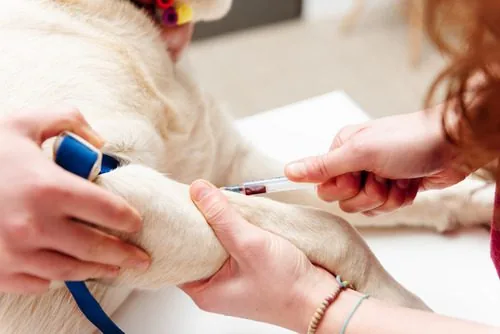Blood work panels for pets are essential diagnostic tools that provide veterinarians with crucial information about a pet’s health. These tests are comprehensive, examining various components of the pet’s blood to assess overall health, diagnose diseases, and monitor organ function. At Rutherford Veterinary Hospital in Dallas, TX, we emphasize the importance of regular blood tests to ensure that pets are healthy and to detect any potential issues early on. If you have any concerns about your pet’s health, please call us at (214) 826-4166 to discuss how blood work panels can be beneficial.

Key Benefits of Regular Blood Testing
Early Detection of Diseases
One of the primary advantages of regular blood work is the early detection of diseases. Conditions such as kidney disease, liver problems, diabetes, and thyroid imbalances can be identified even before symptoms become apparent to the pet owner. Early detection can significantly increase the chances of successful management and treatment, leading to a longer, healthier life for your pet.
Monitoring Health During Ageing
As pets age, their bodies undergo changes that may affect their health. Regular blood tests can help track these changes and provide insights into the health challenges commonly faced by senior pets. This monitoring is vital for adjusting care strategies and treatments to support the quality of life as your pet grows older.
Evaluating Organ Function
Blood work panels are invaluable for assessing the function of critical organs like the kidneys, liver, and pancreas. These tests measure levels of various substances in the blood, such as enzymes and hormones, which indicate how well organs are functioning. If any abnormalities are detected, further investigation and treatment can be initiated promptly.
Types of Blood Work Panels
Complete Blood Count (CBC)
The Complete Blood Count (CBC) is a fundamental component of blood work panels for pets. It measures various factors of the blood, including red blood cells, white blood cells, and platelets. This test helps detect conditions such as anemia, infections, and clotting disorders, providing a snapshot of a pet’s immune response and oxygen-carrying capacity.
Biochemistry Profile
A biochemistry profile provides detailed information about the chemical components in the pet’s blood. This includes glucose levels, liver and kidney enzymes, and electrolytes. Understanding these levels helps veterinarians diagnose diseases, assess organ function, and determine hydration levels.
Thyroid Function Tests
Thyroid function tests are crucial, especially in dogs and cats, where thyroid disease is common. These tests measure the levels of thyroid hormones in the blood, which play a significant role in regulating metabolism. Imbalances can lead to a variety of symptoms and health issues.
When to Perform Blood Work
- Routine Check-Ups: Incorporating blood work into routine check-ups helps maintain a baseline health profile for your pet, which can be invaluable for detecting subtle changes over time. This practice is particularly recommended for pets with chronic conditions or pets that are middle-aged and older.
- Before Surgery: Performing blood work before any surgical procedure ensures that your pet is healthy enough for anesthesia and the surgery itself. It helps identify any underlying conditions that could complicate the procedure or affect recovery.
- Noticing Behavioral Changes: If you notice changes in your pet’s behavior, such as increased lethargy, loss of appetite, or unusual aggression, it’s a good idea to consult with your veterinarian and consider blood work. These changes could be indicators of an underlying health issue.
Why Regular Blood Work is Essential for Your Pet’s Health
At Rutherford Veterinary Hospital, we believe that comprehensive blood work panels for pets are a critical component of preventive health care. They provide essential insights that help us care for your pet effectively throughout their life stages. If you’re in Dallas, TX, and want to ensure your pet’s health is monitored closely, give us a call at (214) 826-4166 to schedule a blood work panel. Regular testing can make a significant difference in the life of your pet by catching potential health issues early when they are often easier to treat or manage. Let us help you keep your pet healthy and happy for years to come.


 Have an Emergency?
Have an Emergency?